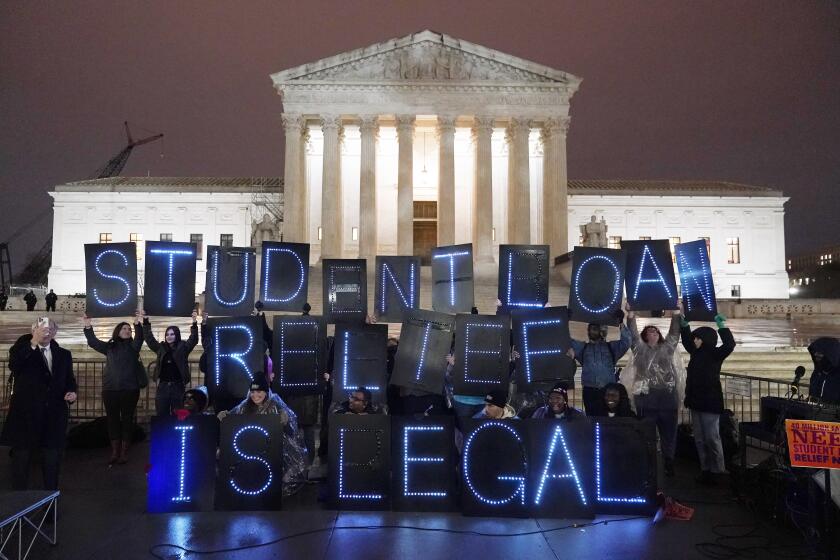Mother Fights Schools on Cable TV
The Glendale mother appeared on local cable TV station Channel 26, much like a veteran news anchorwoman. In Armenian, she laid into the Glendale Unified School District: Teachers don’t teach. Board members don’t listen. School officials don’t translate.
“We are here because we care about our children and what is going on in our schools,” she said, looking distinguished in her sparkly green earrings and matching scarf. A phone number flashed across the screen. “We are live. You can call.”
Using cable access time paid for out of her own pocket, Naira Khachatrian, 44, has become an influential voice among Armenian parents whose children make up about half the 29,400-student Glendale district.
A mother with two children enrolled, she believes the district is shortchanging Armenian students by placing many of them in English-learner programs or special education courses and failing to reach out to immigrant parents.
The district dismisses Khachatrian as a gadfly who has spread fear and mistrust among parents. School officials say she does not explain the extensive programs it offers to Armenian-immigrant students, including translation services for parents and special academic tutoring.
Schools Supt. Michael F. Escalante said that over the last year Khachatrian has spread “rumors about outlandish information. I don’t speak Armenian and it’s done all in Armenian.”
Khachatrian has singled out teachers and questioned their credentials.
She once compared school district officials to those who committed atrocities during the Armenian genocide, the killing of 1.5 million people by the Turks between 1915 and 1922. School officials said they have given up on countering her numerous statements.
One official says Khachatrian has made positive contributions.
School board President Greg Krikorian said the show has bridged a communication gap with Armenian-immigrant parents who are struggling to navigate district bureaucracy.
“There are things we do have to improve,” Krikorian said, although he, too, is frustrated by the comments on her show. “Maybe they’re not understanding the information we give to them.”
Khachatrian, who immigrated to the United States in 1991, has seized on the lack of communication between Armenian immigrant parents and the district.
A former engineer who is married to a contractor, her involvement in school district politics began when her oldest son was placed in English-learner classes more than a decade ago. She said she did not understand what the classes entailed or that she had a choice in her son’s enrollment.
About one-third of Armenian students in the Glendale district are enrolled in English-learner classes, a separate track in which math, science and history are taught while integrating English skills into the required curriculum. Teachers use more pictures, gestures and simple English to better communicate lessons
Without such a program, district officials say, students struggle through regular coursework because they have not mastered English. Parents must give their permission before children are enrolled in the voluntary program.
Once enrolled, a student typically stays on the English-learner track until he or she passes a proficiency test.
Khachatrian says the district is shortchanging some students who she believes are being placed in the program unnecessarily.
Khachatrian said she can relate to Armenian parents who do not understand the rules.
“The one way we can change these people is we have to educate the parents,” she said. “That’s why we came up with that idea” of going on television.
Every few days or weeks, Khachatrian pays $500 to $800 for an hour-long slot on the Armenian Media Group of America Inc. cable channel, which serves more than 27,000 viewers in the Los Angeles area. Khachatrian co-anchors with another Glendale parent and friend, Hasmig Aslanian.
During a recent broadcast, more than a dozen parents phoned in asking about translators, college admissions rules and the federal No Child Left Behind law -- issues that the district does not believe she is qualified to answer.
She said she has become a self-made local celebrity. “Now when I go to the store,” Khachatrian said, “everybody is stopping me.” The show’s popularity also prompts about 50 parents a day to call her at home with more questions, she said.
“People call Jerry Springer” too, Escalante said. “This is America, so people have those rights. It requires us to do additional work to properly inform to those people.”
Krikorian says the district is making progress in its outreach efforts.
He has organized Armenian community forums for parents and groups to talk about the schools. The district also aired television programs on an Armenian station, but Khachatrian would call in live and criticize district officials, he said.
Though he supports the English-learner program, Krikorian said the district should evaluate its progress and the length of time students are enrolled in it.
“What concerns me is she’s getting people [who] belong in this program out,” Krikorian said.
District officials are “scared of her. They’re scared,” said Vazken Movsesian, a Glendale priest who runs an after-school program and supports Khachatrian. He said he noticed many students “hitting their heads against the wall because they were frustrated, because they couldn’t move ahead.”
He met Khachatrian at a school board meeting. “For the first time I saw a woman, Naira, who was really advocating for the students,” he said. “She had no other motive.”
Some parents said the TV broadcast is their main link to understanding district policies.
Eskouhi Irzakhanian, the mother of a fifth-grader in Glendale Unified, called Khachatrian after watching the program earlier this year.
She believes the district unfairly placed her son in special education classes and did not explain why. “He’s just lazy,” she said, “but laziness is not disability.”
She signed consent forms without knowing what they meant. It was Khachatrian who explained her rights.
“In my country, Armenia, we know what’s going on. We know the laws. We grew up there,” Irzakhanian said. “But here, we are new. We need someone to explain.” Without the TV show, she added, “how would we know?”
More to Read
Sign up for Essential California
The most important California stories and recommendations in your inbox every morning.
You may occasionally receive promotional content from the Los Angeles Times.






